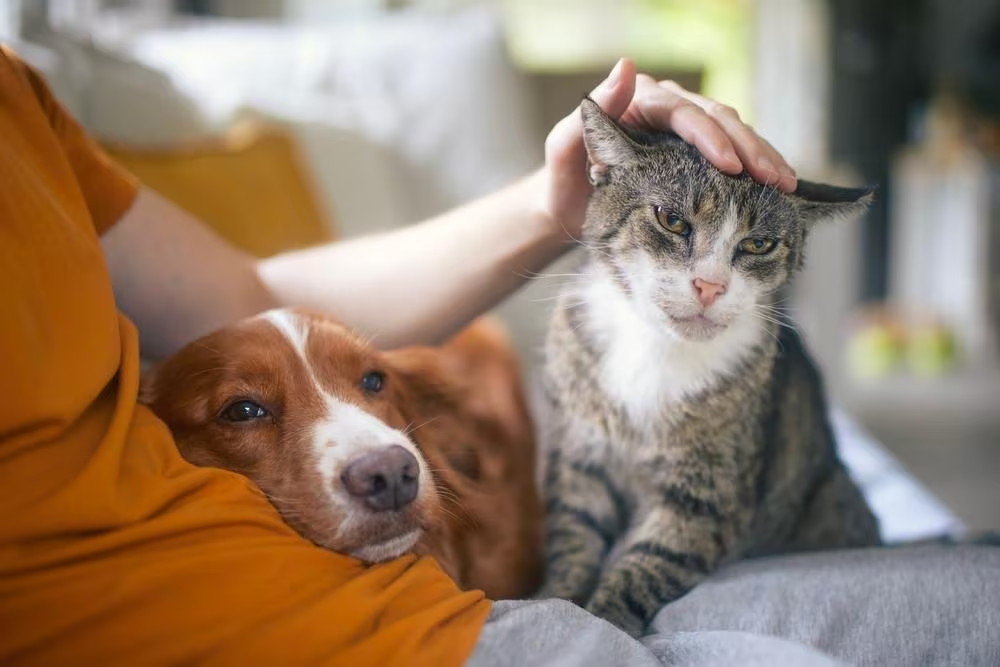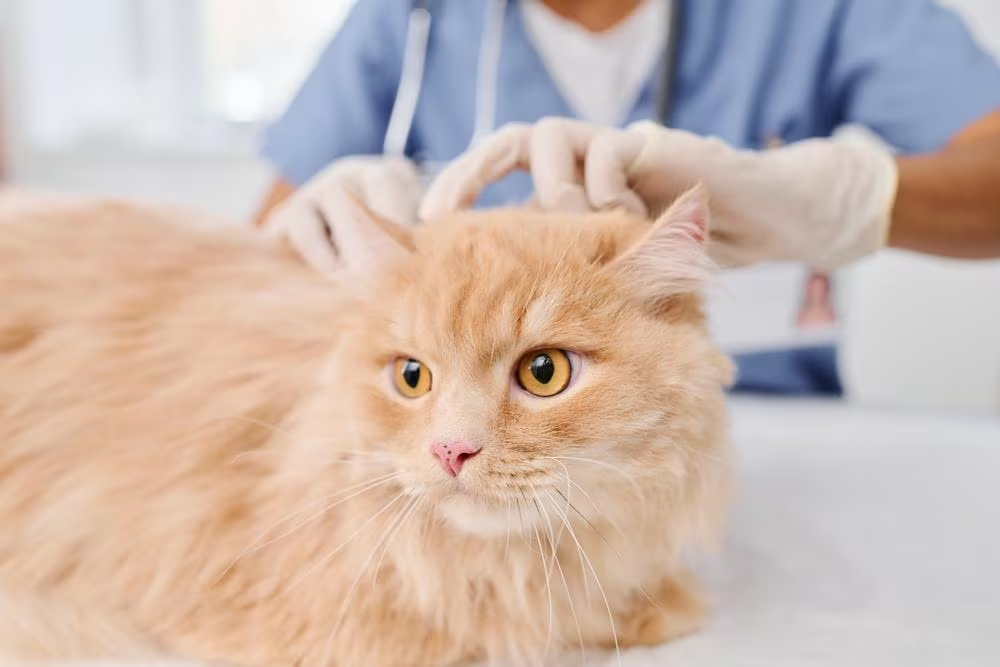
-
Find the right food for your pet
Take this quiz to see which food may be the best for your furry friend.
Find the right food for your pet
Take this quiz to see which food may be the best for your furry friend.
Featured products
 Adult Healthy Cuisine Roasted Chicken, Carrots & Spinach Stew Dog Food
Adult Healthy Cuisine Roasted Chicken, Carrots & Spinach Stew Dog FoodDelicious roasted chicken paired with tender vegetables in a succulent stew
Shop Now Adult 7+ Perfect Digestion Chicken, Whole Oats & Brown Rice Recipe Dog Food
Adult 7+ Perfect Digestion Chicken, Whole Oats & Brown Rice Recipe Dog FoodScience Diet's breakthrough nutrition supports ultimate digestive well-being & healthy microbiome for dogs age 7+
Shop Now Small & Mini Savory Stew with Chicken & Vegetables Dog Food
Small & Mini Savory Stew with Chicken & Vegetables Dog FoodA delicious complement to the nutrition of Science Diet Small & Mini 7+ dog food
Shop NowFeatured products
 Adult 7+ Tender Tuna Dinner Cat Food
Adult 7+ Tender Tuna Dinner Cat FoodWith delicious chunks in a decadent gravy
Shop Now Adult 7+ Senior Vitality Chicken & Vegetable Stew Cat Food
Adult 7+ Senior Vitality Chicken & Vegetable Stew Cat FoodImproves Everyday Ability to Get Up & Go
Shop Now Adult Savory Entrée Can Variety Pack Cat Food
Adult Savory Entrée Can Variety Pack Cat FoodPrecisely balanced nutrition with the delicious taste of savory minced chicken to help fuel the energy needs of cats during the prime of their life
Shop Now -
Dog
- Dog Tips & Articles
-
Health Category
- Weight
- Food & Environmental Sensitivities
- Urinary
- Digestive
- Joint
- Kidney
-
Life Stage
- Puppy Nutrition
- Adult Nutrition
- Senior Nutrition
Cat
- Cat Tips & Articles
-
Health Category
- Weight
- Skin & Food Sensitivities
- Urinary
- Digestive
- Kidney
-
Life Stage
- Kitten Nutrition
- Adult Nutrition
Featured articles
 Do Dogs and Cats have Belly Buttons?
Do Dogs and Cats have Belly Buttons?Learn whether cats & dogs have belly buttons like humans, what the function is, and if there are any health concerns associated with it.
Read More Why Are Dogs and Cats So Cute?
Why Are Dogs and Cats So Cute?If waggy puppy dog tails and furry kitten yawns make you swoon, you're not alone. Why are cats so cute? And, dogs too! Let's find out!
Read More Does My Pet Hate Me?
Does My Pet Hate Me?Learn tips for bonding with your pet if you've ever thought, 'My dog doesn't like me, or 'Why do I have a standoffish cat?'
Read More -


As a responsible pet parent, you want to feed your dog or cat food that helps them thrive. Plenty of pet foods advertise cat and dog food for skin and coat health, but what does this really mean? Nutrition is important to maintain all aspects of your pet's health. However, choosing a dog or cat food for skin and coat health isn't the only way to support a smooth, shiny coat. Learn how nutrition, grooming and veterinary care work together to help keep your pet looking and feeling good.
Grooming for Healthy Skin and Coat
One of the most important ways to keep your pet's skin and coat healthy at home is to groom them regularly. As a general rule, you should brush your pets at least once a week to distribute natural oils, prevent tangles, and remove dirt and debris. For cats, grooming also helps reduce hairballs.
However, different characteristics — long hair versus short hair, single coat versus double coat — can influence your dog's or cat's needs. Your veterinarian is your personal pet expert, so they're a wonderful resource for advice and grooming tools. You can also check out dog breed and cat breed databases to help identify your pet's coat characteristics and understand how much maintenance they require.
For example, a husky may need daily brushing during shedding season, while a beagle might be fine with a quick brush once a week. Dogs with thinner, light-colored skin, like pit bull mixes, can be more susceptible to skin irritations like sunburn, insect bites and seasonal allergies.

Signs of Skin and Coat Concerns
Taking dedicated time to care for your pet's coat can also help you spot any concerns that need a vet's attention. Cats are devoted self-groomers, so an unkempt coat can be a sign your kitty isn't feeling well. Conditions such as arthritis and obesity can make it difficult for your cat to reach certain spots. A dull, greasy or matted coat can also indicate something's amiss. Stress can lead to overgrooming in dogs and cats, too.
When brushing your cat or dog, keep an eye out for these signs:
Excessive shedding or bald patches
Red or irritated skin
Sores, bumps, scabs or increased skin odor
Greasiness
Dandruff
External parasites, such as fleas or ticks
If you notice any of these signs, schedule an appointment with your veterinarian to determine the cause of your pet's coat issues.


Tasty Tips
Young pets may need several visits in their first year for vaccinations. Adult pets generally benefit from annual check-ups, while senior or special-needs pets might require more frequent visits.
The Effects of Nutrition on Skin and Coat Health
Skin is the largest organ in the body. So, it may not come as a surprise that the effects of nutrition on skin and coat can be the difference between a full, shiny coat and a dry, brittle one. In otherwise healthy pets, feeding your cat or dog a complete and balanced pet food is typically sufficient to maintain healthy skin and coat.
Here are some common nutrients that support pets' skin health.
Essential Fatty Acids
Fatty acids omega-6 and omega-3 support skin health and a shiny coat. They replace the skin's natural oils and promote the skin's structural integrity and barrier function. Omega-3, typically found in ingredients like fish oil, also helps regulate the skin's inflammatory response, which can relieve itchy or inflamed skin.
Vitamins and Minerals
Your pet requires essential vitamins and minerals to maintain overall health, and their skin and coat are no exception. For example, antioxidant vitamin E softens skin, protects against free radical damage and may reduce joint inflammation. Lacking certain nutrients — including biotin, zinc, magnesium, vitamin A and other minerals — may also lead to skin disease.
More generally, vitamin and mineral deficiencies can compromise your dog's or cat's immune function and increase their risk of skin infections and external parasites. When you feed your pet a complete and balanced food appropriate for their life stage, you can feel confident they're getting the precise balance of nutrients they need to thrive. If they need additional support, your veterinarian can help you identify a food formulated to promote skin and coat health.
Probiotics
The skin and gut are constantly exposed to external elements. Studies show a connection between gut health and skin health, and most pets who have food allergies exhibit signs of both skin and gut concerns. So, a healthy gut microbiome is integral to overall health, including skin health. In some cases, your veterinarian may recommend a food formulated with probiotics or prebiotics (which feed healthy bacteria) or a probiotic supplement to support your pet's gut health.

Consult Your Veterinarian
If you're feeding your pet a complete and balanced food but notice your cat scratching their ears or your dog constantly licking themselves, make an appointment with your vet. Fleas, ticks, seasonal allergies and food intolerance are all possible causes. Take inventory of any new cleaning products, air fresheners, colognes or soaps you've recently introduced into your house, too. Environmental factors like these can also cause an allergic response in your pet and lead to itching or other signs of skin concerns.
Your veterinarian will ask you about your pet's home and history, give them a full-body exam and may recommend specialized skin or blood tests or a food elimination trial to determine what's bothering them. From there, your vet can recommend an appropriate course of treatment. Treatment varies depending on the underlying cause but can include oral or topical medication, flea prevention or food changes.
If your vet suspects an ingredient allergy, they'll suggest a special food to determine whether a food allergy is to blame. Always follow your veterinarian's instructions closely. Diagnosing an ingredient allergy relies on adherence to a specific process. If your pet's condition improves with the new food, talk with your vet before changing to a different food.
Taking a Comprehensive Approach to Pet Care
With the right treatment, most pets can feel and look better quickly. With a combination of cat or dog food for skin and coat health, proper grooming and regular vet checkups, you can keep your pet's coat and skin healthy and vibrant for years to come. Cheers to that!


Chrissie Klinger is an educator, writer and mother of two children, three dogs and three cats. Her dog Jake loves sitting on her lap every chance he gets! She enjoys living an active and eco-friendly lifestyle in rural Pennsylvania.
Related products

Improves Everyday Ability to Get Up & Go

Supports energy level and beautiful fur in mature cats

Precisely balanced nutrition with the delicious taste of savory minced chicken to help fuel the energy needs of cats during the prime of their life

With delicious chunks in a decadent gravy
Related articles

Learn whether cats & dogs have belly buttons like humans, what the function is, and if there are any health concerns associated with it.

Discover how your pets might be impacted by the loss of another. Learn how to recognize their signs of grieving & how to help them cope with their loss.

If waggy puppy dog tails and furry kitten yawns make you swoon, you're not alone. Why are cats so cute? And, dogs too! Let's find out!

Learn tips for bonding with your pet if you've ever thought, 'My dog doesn't like me, or 'Why do I have a standoffish cat?'

Put your pet on a diet without them knowing
Our low calorie formula helps you control your pet's weight. It's packed with high-quality protein for building lean muscles, and made with purposeful ingredients for a flavorful, nutritious meal. Clinically proven antioxidants, Vitamin C+E, help promote a healthy immune system.
Put your pet on a diet without them knowing
Our low calorie formula helps you control your pet's weight. It's packed with high-quality protein for building lean muscles, and made with purposeful ingredients for a flavorful, nutritious meal. Clinically proven antioxidants, Vitamin C+E, help promote a healthy immune system.

